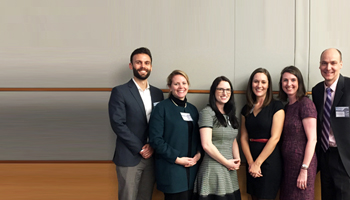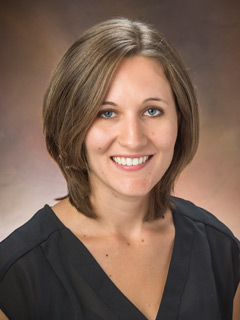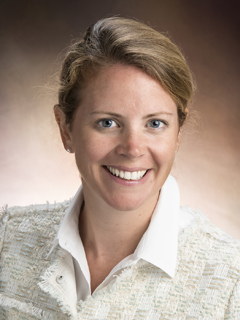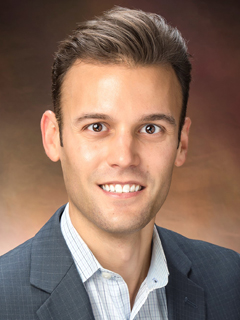HOW CAN WE HELP YOU? Call 1-800-TRY-CHOP
In This Section
Entrepreneurial Science Scholars Turn Ideas Into Medical Innovation
 By definition, entrepreneurs are energetic leaders who challenge existing ideas to drive impactful change. Entrepreneurs think outside the box, follow their passion, and stay resilient and resourceful to achieve their goals. At Children’s Hospital of Philadelphia, fellows in the Entrepreneurial Science Scholars Program do all of these things — and more — to improve the health of children and families.
By definition, entrepreneurs are energetic leaders who challenge existing ideas to drive impactful change. Entrepreneurs think outside the box, follow their passion, and stay resilient and resourceful to achieve their goals. At Children’s Hospital of Philadelphia, fellows in the Entrepreneurial Science Scholars Program do all of these things — and more — to improve the health of children and families.
On Feb. 22, we celebrated this year’s CHOP Entrepreneurial Science Scholars, a group of six clinician-researchers who are conducting pioneering research and innovation in diverse and critical fields. The CHOP Entrepreneurial Science Scholars Program aims to produce highly trained investigators skilled in translational research and the generation of creative solutions to biomedical problems. Joseph St. Geme, MD, Physician-in-Chief and Chairman of the Department of Pediatrics at CHOP, hosted the event.
“I think you’ll get a feel over the next 60 minutes for the range of projects that this program has supported and the range of medical issues that this program is addressing,” Dr. St. Geme said. “In my mind, it’s very impressive to see how much progress each of these scholars has made. The first cohort of scholars is in their third year of support, the second year of scholars is in their second year of support, and it really is staggering to see where they stand in terms of their projects.”
A truly unique and collaborative endeavor, scholars in the CHOP Entrepreneurial Science Program participate in the Masters in Translational Research, Entrepreneurial Science Track (MTR-EntSci) at the Perelman School of Medicine at the University of Pennsylvania, an academic program designed to give trainees the opportunity to translate biomedical research into innovative medical solutions. Each scholar also works closely with a research mentor who has a track record in successful innovation and in developing intellectual property with potential for commercialization. Dr. St. Geme added that the program also makes an effort to ensure each individual has a business mentor — someone who can “think with them” about how to translate their work into therapeutics and devices that will truly touch patients.
 One of the scholars, Helge Hartung, MD, attending physician in the Pediatric Comprehensive Bone Marrow Failure Center and the Division of Hematology at CHOP and assistant professor of Pediatrics at Penn, described the value of the MTR-EntSci program during the event, particularly its ability to empower faculty to pursue innovation goals aligned with the long-term strategies of CHOP and Penn. The program provides scholars with the opportunity to attend unique classes at Wharton such as Device Development and Health Entrepreneurship, connect with business advisors, and overall develop skills through connection and networking — a key part of the CHOP innovation ecosystem.
One of the scholars, Helge Hartung, MD, attending physician in the Pediatric Comprehensive Bone Marrow Failure Center and the Division of Hematology at CHOP and assistant professor of Pediatrics at Penn, described the value of the MTR-EntSci program during the event, particularly its ability to empower faculty to pursue innovation goals aligned with the long-term strategies of CHOP and Penn. The program provides scholars with the opportunity to attend unique classes at Wharton such as Device Development and Health Entrepreneurship, connect with business advisors, and overall develop skills through connection and networking — a key part of the CHOP innovation ecosystem.
And in the true spirit of entrepreneurship, the presentations reflected novel research and groundbreaking ideas on the cusp of basic and translational pediatric science. Each scholar presented research projects that ranged from efforts to help parents quit smoking to the development of novel reversal strategies for the anticoagulant Warfarin.
First-of-its-kind Human Beta Cell Line to Advance Diabetes Research
 Kicking off the presentations, Amanda Ackermann, MD, PhD, attending physician in the Division of Endocrinology and Diabetes at CHOP and instructor in Pediatrics at Penn, described her project generating a first-ever human beta cell line to move research and innovation toward a cure for diabetes. Beta cells store and secrete insulin, the hormone that converts food into energy for our cells, and their deficiency can cause types 1 and 2 diabetes. Dr. Ackermann’s development of a human beta cell line could help scientists better understand basic beta cell biology and contribute to diabetes drug testing. In therapeutics, human beta cells could potentially be used for beta cell/islet transplantation for types 1 or 2 diabetes.
Kicking off the presentations, Amanda Ackermann, MD, PhD, attending physician in the Division of Endocrinology and Diabetes at CHOP and instructor in Pediatrics at Penn, described her project generating a first-ever human beta cell line to move research and innovation toward a cure for diabetes. Beta cells store and secrete insulin, the hormone that converts food into energy for our cells, and their deficiency can cause types 1 and 2 diabetes. Dr. Ackermann’s development of a human beta cell line could help scientists better understand basic beta cell biology and contribute to diabetes drug testing. In therapeutics, human beta cells could potentially be used for beta cell/islet transplantation for types 1 or 2 diabetes.
Microbiome’s Role in Very Early Onset Inflammatory Bowel Disease
 Next, Máire Conrad, MD, MS, gastroenterologist in the Division of Gastroenterology, Hepatology, and Nutrition at CHOP and instructor in Pediatrics at Penn, presented her research into the intestinal microbiome in very early onset inflammatory bowel disease (VEO-IBD). Children who have IBD from a young age (younger than 6 years old) typically do not respond to traditional IBD treatments, exhibit different symptoms than older children or adults, and require more targeted treatments. They have a high morbidity with a longer burden of disease over their lifetime. Furthermore, their conditions often consist of different genomic contributions. Dr. Conrad and her colleagues in the CHOP VEO-IBD Program currently conduct research that combines analysis of the underlying genes and immune pathways that play a role in VEO-IBD’s development (through whole exome sequencing) with examinations of the different bacteria in the intestinal tract of children with VEO-IBD.
Next, Máire Conrad, MD, MS, gastroenterologist in the Division of Gastroenterology, Hepatology, and Nutrition at CHOP and instructor in Pediatrics at Penn, presented her research into the intestinal microbiome in very early onset inflammatory bowel disease (VEO-IBD). Children who have IBD from a young age (younger than 6 years old) typically do not respond to traditional IBD treatments, exhibit different symptoms than older children or adults, and require more targeted treatments. They have a high morbidity with a longer burden of disease over their lifetime. Furthermore, their conditions often consist of different genomic contributions. Dr. Conrad and her colleagues in the CHOP VEO-IBD Program currently conduct research that combines analysis of the underlying genes and immune pathways that play a role in VEO-IBD’s development (through whole exome sequencing) with examinations of the different bacteria in the intestinal tract of children with VEO-IBD.
Novel Reversal Strategy for the Effects of Blood Thinner
 Lindsey George, MD, attending physician in the Division of Hematology at CHOP and instructor in Pediatrics at Penn, described her development of a novel reversal strategy for the most commonly used oral anticoagulant, Warfarin. Though the blood thinner can help to prevent clotting in patients with blood clots, it also remains the number one reason for adverse drug events and hospitalization for patients over 65 years old. Warfarin is also associated with intracranial hemorrhage. Dr. George’s research focuses on the development of one specific reversal strategy using factor XaI6L (FXaI6L). Pre-clinical data show that FXaI6L can reverse the anticoagulant effect of Warfarin, and these results can potentially be translated to a clinical trial.
Lindsey George, MD, attending physician in the Division of Hematology at CHOP and instructor in Pediatrics at Penn, described her development of a novel reversal strategy for the most commonly used oral anticoagulant, Warfarin. Though the blood thinner can help to prevent clotting in patients with blood clots, it also remains the number one reason for adverse drug events and hospitalization for patients over 65 years old. Warfarin is also associated with intracranial hemorrhage. Dr. George’s research focuses on the development of one specific reversal strategy using factor XaI6L (FXaI6L). Pre-clinical data show that FXaI6L can reverse the anticoagulant effect of Warfarin, and these results can potentially be translated to a clinical trial.
Epigenomic Changes in Chronic Kidney Disease
 Caroline Gluck, MD, attending physician in the Division of Nephrology at CHOP and instructor in Pediatrics at Penn, presented her research into how kidney epigenomic changes can improve models of chronic kidney disease (CKD) progression. Changes to the epigenome can occur when environmental influences interact with genes to produce alterations in gene expression. Incidences of CKD in children have increased over the last two decades, characterized by irreversible deterioration of renal function that can gradually progress to end-stage renal disease (ESRD). Identifying which CKD patients will rapidly progress to ESRD is crucial. In her research, Dr. Gluck studied whether cytosine methylation, a type of epigenomic change, predicted outcomes for patients with CKD. After building a CKD progression model with data from 91 patients, Dr. Gluck found that methylation profiles may help to identify patients who will rapidly progress to ESRD. The development of diagnostic tools and targeted therapeutics present a rich entrepreneurial opportunity.
Caroline Gluck, MD, attending physician in the Division of Nephrology at CHOP and instructor in Pediatrics at Penn, presented her research into how kidney epigenomic changes can improve models of chronic kidney disease (CKD) progression. Changes to the epigenome can occur when environmental influences interact with genes to produce alterations in gene expression. Incidences of CKD in children have increased over the last two decades, characterized by irreversible deterioration of renal function that can gradually progress to end-stage renal disease (ESRD). Identifying which CKD patients will rapidly progress to ESRD is crucial. In her research, Dr. Gluck studied whether cytosine methylation, a type of epigenomic change, predicted outcomes for patients with CKD. After building a CKD progression model with data from 91 patients, Dr. Gluck found that methylation profiles may help to identify patients who will rapidly progress to ESRD. The development of diagnostic tools and targeted therapeutics present a rich entrepreneurial opportunity.
Novel Automated Device for Bone Marrow Aspirates and Biopsies
Dr. Hartung described the development of an automated device for bone marrow (BM) aspirates and biopsies in pediatric patients. Many childhood cancers require a BM aspirate and biopsy, with 3.9 million BM biopsies conducted annually around the world. Current technology, however, has its limitations and drawbacks. Through the novel automated device, Hartung and his colleagues hoped to address some of the limitations and drawbacks of current biopsy technologies, including pain from the procedures (often requiring the need for anesthesia) and reoperation rates.
Online Tool to Help Parents Quit Smoking
 Closing off the presentations, Brian Jenssen, MD, MSHP, primary care pediatrician in the Division of General Pediatrics at CHOP and instructor in Pediatrics at Penn, presented his research on interventions that pediatricians can utilize in clinical practice to help parents quit smoking. Cigarette smoking is the leading cause of disease and death in the United States, accounting for half a million premature deaths every year. Secondhand smoke alone is associated with 41,000 deaths, and 38 million children are regularly exposed to secondhand smoke. With parental smoking cessation a “policy priority,” pediatricians are in a powerful position to intervene and improve outcomes for both parents and children. With his colleagues, Dr. Jenssen developed a clinical decision support tool embedded into the electronic health record that prompts physicians to ask parents about smoking habits and secondhand smoke exposure. The team measured outcomes in terms of quit rates and enrollment in Quitline, a free, evidence-based tobacco cessation service.
Closing off the presentations, Brian Jenssen, MD, MSHP, primary care pediatrician in the Division of General Pediatrics at CHOP and instructor in Pediatrics at Penn, presented his research on interventions that pediatricians can utilize in clinical practice to help parents quit smoking. Cigarette smoking is the leading cause of disease and death in the United States, accounting for half a million premature deaths every year. Secondhand smoke alone is associated with 41,000 deaths, and 38 million children are regularly exposed to secondhand smoke. With parental smoking cessation a “policy priority,” pediatricians are in a powerful position to intervene and improve outcomes for both parents and children. With his colleagues, Dr. Jenssen developed a clinical decision support tool embedded into the electronic health record that prompts physicians to ask parents about smoking habits and secondhand smoke exposure. The team measured outcomes in terms of quit rates and enrollment in Quitline, a free, evidence-based tobacco cessation service.